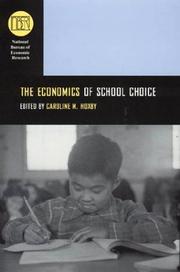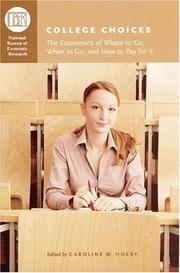| Listing 1 - 10 of 11 | << page >> |
Sort by
|
Book
Year: 1994 Publisher: Cambridge, Mass. National Bureau of Economic Research
Abstract | Keywords | Export | Availability | Bookmark
 Loading...
Loading...Choose an application
- Reference Manager
- EndNote
- RefWorks (Direct export to RefWorks)
Book
Year: 1994 Publisher: Cambridge, Mass. National Bureau of Economic Research
Abstract | Keywords | Export | Availability | Bookmark
 Loading...
Loading...Choose an application
- Reference Manager
- EndNote
- RefWorks (Direct export to RefWorks)
Book
Year: 1994 Publisher: Cambridge, Mass. National Bureau of Economic Research
Abstract | Keywords | Export | Availability | Bookmark
 Loading...
Loading...Choose an application
- Reference Manager
- EndNote
- RefWorks (Direct export to RefWorks)
Book
Year: 1994 Publisher: Cambridge, Mass. National Bureau of Economic Research
Abstract | Keywords | Export | Availability | Bookmark
 Loading...
Loading...Choose an application
- Reference Manager
- EndNote
- RefWorks (Direct export to RefWorks)
Book
Year: 1995 Publisher: Cambridge National Bureau Of Economic Research
Abstract | Keywords | Export | Availability | Bookmark
 Loading...
Loading...Choose an application
- Reference Manager
- EndNote
- RefWorks (Direct export to RefWorks)
Education --- -School budgets --- -Finance --- -Econometric models --- Effect of state aid to education on --- -Econometric models
Book
ISBN: 9780226201979 022620197X 9780226201832 Year: 2014 Publisher: Chicago
Abstract | Keywords | Export | Availability | Bookmark
 Loading...
Loading...Choose an application
- Reference Manager
- EndNote
- RefWorks (Direct export to RefWorks)
The recent financial crisis had a profound effect on both public and private universities, which faced shrinking endowments, declining charitable contributions, and reductions in government support. Universities responded to these stresses in different ways. This volume presents new evidence on the nature of these responses, and on how the incentives and constraints facing different institutions affected their behavior. The studies in this volume explore how various practices at institutions of higher education, such as the drawdown of endowment resources, the awarding of financial aid, and spending on research, responded to the financial crisis. The studies examine universities as economic organizations that operate in a complex institutional and financial environment. The authors examine the role of endowments in university finances and the interaction of spending policies, asset allocation strategies, and investment opportunities. They demonstrate that universities' behavior can be modeled using economic principles.
Education, Higher --- Education and state --- Global Financial Crisis, 2008-2009 --- Global Economic Crisis, 2008-2009 --- Subprime Mortgage Crisis, 2008-2009 --- Financial crises --- Finance --- Global Financial Crisis (2008-2009) --- E-books --- Global Financial Crisis, 2008-2009. --- Finance. --- education funding, microeconomics, private universities, public university, shrinking endowments, declining charitable contributions, development, government support, revenue, wealth, money, donations, economics, finance, student aid, research spending, economic organizations, budgeting policies, asset allocation strategies, investment opportunities, staff reductions, recession, 2008, global financial crisis, positive model, faculty labor markets, college enrollment.
Book
ISBN: 9780226574585 022657458X Year: 2019 Publisher: Chicago: University of Chicago press,
Abstract | Keywords | Export | Availability | Bookmark
 Loading...
Loading...Choose an application
- Reference Manager
- EndNote
- RefWorks (Direct export to RefWorks)
"This book provides a comprehensive treatment, with chapters that examine the returns to undergrad education, how costs differ by major, the productivity of for-profit schools, the productivity of various types of faculty, how online education has affected the market, and more. This work addresses the five challenges to assessing productivity in higher ed: multiple outcomes, the "multi-product" nature of institutions, selection, attribution, and the public nature of some benefits"--
Educational productivity --- Education, Higher --- Educational accountability

ISBN: 0226355330 9786611125738 1281125733 0226355349 9780226355344 9780226355337 9781281125736 6611125736 Year: 2003 Publisher: Chicago University of Chicago Press
Abstract | Keywords | Export | Availability | Bookmark
 Loading...
Loading...Choose an application
- Reference Manager
- EndNote
- RefWorks (Direct export to RefWorks)
Now that the U.S. Supreme Court has declared school voucher programs constitutional, the many unanswered questions concerning the potential effects of school choice will become especially pressing. Contributors to this volume draw on state-of-the-art economic methods to answer some of these questions, investigating the ways in which school choice affects a wide range of issues. Combining the results of empirical research with analyses of the basic economic forces underlying local education markets, The Economics of School Choice presents evidence concerning the impact of school choice on student achievement, school productivity, teachers, and special education. It also tackles difficult questions such as whether school choice affects where people decide to live and how choice can be integrated into a system of school financing that gives children from different backgrounds equal access to resources. Contributors discuss the latest findings on Florida's school choice program as well as voucher programs and charter schools in several other states. The resulting volume not only reveals the promise of school choice, but examines its pitfalls as well, showing how programs can be designed that exploit the idea's potential but avoid its worst effects. With school choice programs gradually becoming both more possible and more popular, this book stands out as an essential exploration of the effects such programs will have, and a necessary resource for anyone interested in the idea of school choice.
School choice --- Educational vouchers --- Economic aspects --- Educational vouchers. --- Educational vouchers - United States. --- School choice - Economic aspects - United States. --- School choice. --- Education --- Social Sciences --- Theory & Practice of Education --- Choice of school --- Parents' choice of school --- School, Choice of --- Schools --- Selection --- economy, money, wealth, income, class, education, educational, schooling, k12, contemporary, 20th century, supreme court, united states, usa, american, america, constitutional, voucher, program, essay collection, research, analysis, economics, market, achievement, productivity, students, teachers, special ed, financing, equality, inequality, charter, district.

ISBN: 1281125741 9786611125745 0226355373 9780226355375 0226355357 9780226355351 9781281125743 Year: 2004 Publisher: Chicago University of Chicago Press
Abstract | Keywords | Export | Availability | Bookmark
 Loading...
Loading...Choose an application
- Reference Manager
- EndNote
- RefWorks (Direct export to RefWorks)
Aspiring college students and their families have many options. A student can attend an in-state or an out-of-state school, a public or private college, a two-year community college program or a four-year university program. Students can attend full-time and have a bachelor of arts degree by the age of twenty-three or mix college and work, progressing toward a degree more slowly. To make matters more complicated, the array of financial aid available is more complex than ever. Students and their families must weigh federal grants, state merit scholarships, college tax credits, and college savings accounts, just to name a few. In College Choices, Caroline Hoxby and a distinguished group of economists show how students and their families really make college decisions-how they respond to financial aid options, how peer relationships figure in the decision-making process, and even whether they need mentoring to get through the admissions process. Students of all sorts are considered-from poor students, who may struggle with applications and whether to continue on to college, to high aptitude students who are offered "free rides" at elite schools. College Choices utilizes the best methods and latest data to analyze the college decision-making process, while explaining how changes in aid and admissions practices inform those decisions as well.
College choice --- Student aid --- College attendance --- Academic probation --- Attendance, College --- College enrollment --- Probation, Academic --- University attendance --- School attendance --- Aid, Student --- Financial aid, Student --- Financial aid to students --- Student financial aid --- Student financial assistance --- Education --- Choice of college --- College, Choice of --- Universities and colleges --- School choice --- Economic aspects --- Finance --- Selection --- college guides, handbook, business, economics, students, parents, public schools, private, higher education, educational policy, community program, four-year degree plan, application process, job prospects, tuition, books, united states, admissions, financial aid, student debt, tax credits, bachelor of arts, graduate ed, economists, attendance.
Book
Year: 1994 Publisher: Cambridge, Mass. National Bureau of Economic Research
Abstract | Keywords | Export | Availability | Bookmark
 Loading...
Loading...Choose an application
- Reference Manager
- EndNote
- RefWorks (Direct export to RefWorks)
Arguments in favor of school choice depend on the idea that competition between schools improves the quality of education. However, we have almost no empirical evidence on whether competition actually affects school quality. In this study, I examine the effects of inter-school competition on public schools by using exogenous variation in the availability and costs of private school alternatives to public schools. Because low public school quality raises the demand for private schools as substitutes for public schools, we cannot simply compare public school students' outcomes in areas with and without substantial private school enrollment. Such simple comparisons confound the effect of greater private school competitiveness with the increased demand for private schools where the public schools are poor in quality. I derive instruments for private school competition from the fact that it is less expensive and difficult to set up religious schools, which accounts for 9 out of 10 private school students in the U.S., in areas densely populated by members of the affiliated religion. I find that greater private school competitiveness significantly raises the quality of public schools, as measured by the educational attainment, wages, and high school graduation rates of public school students. In addition, I find some evidence that public schools react to greater competitiveness of private schools by paying higher teacher salaries.
| Listing 1 - 10 of 11 | << page >> |
Sort by
|

 Search
Search Feedback
Feedback About UniCat
About UniCat  Help
Help News
News